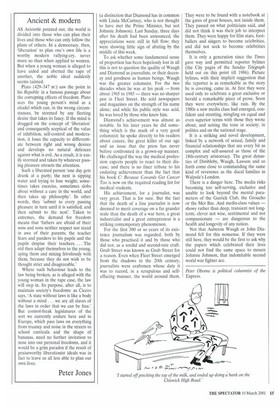Ancient & modern
AS Aristotle pointed out, the world is divided into those who can plan their lives and those who can only follow the plans of others. In a democracy, then, 'liberation' to plan one's own life is a worthy modern rallying-ciy, never more so than when applied to women. But when a young woman is alleged to have aided and abetted the rape of another, the noble ideal suddenly seems tainted.
Plato (429-347 BO saw the point in his Republic in a famous passage about the corrupting effects of freedom. Plato sees the young person's mind as a citadel which can, in the wrong circumstances, be stormed by any fleeting desire that takes its fancy. If the mind is drugged on the concept of 'liberation' and consequently sceptical of the value of inhibition, self-control and moderation, it loses the capacity to differentiate between right and wrong desires and develops no natural defences against what is evil. As a result, it is easily stormed and taken by whatever passing pleasure attracts the attention.
Such a liberated person 'one day gets drunk at a party; the next is sipping water and trying to lose weight; sometimes takes exercise, sometimes slobs about without a care in the world, and then takes up philosophy'. In other words, they 'submit to every passing pleasure in turn until it is satisfied, and then submit to the next'. Taken to extremes, the demand for freedom means that 'fathers are afraid of their sons and sons neither respect nor stand in awe of their parents; the teacher fears and panders to his pupils and the pupils despise their teachers.... The old then adapt themselves to the young, aping them and mixing frivolously with them, because they do not wish to be thought strict and disagreeable.'
Where such behaviour leads to the law being broken, as is alleged with the young woman in the rape case, the law will step in. Its purpose, after all, is to maintain society's freedoms: as Cicero says, 'A state without laws is like a body without a mind . . we are all slaves of the laws in order that we can be free.' But control-freak legislatures of the sort we currently endure here and in Europe, which pass laws on everything from truancy and noise in the streets to school curricula and the shape of bananas, need no further invitation to nose into our personal freedoms, and it would be a grim paradox if the result of praiseworthy liberationist ideals was in fact to leave us all less able to plan our own lives.
Peter Jones


































































 Previous page
Previous page